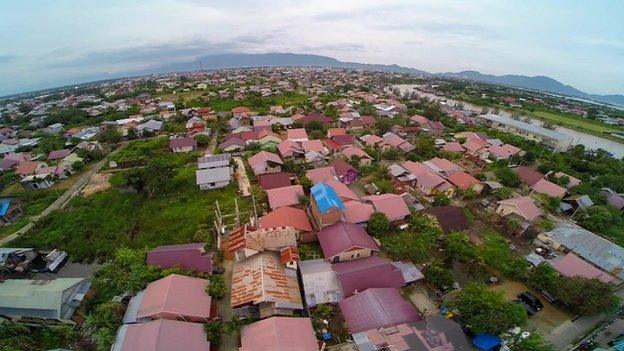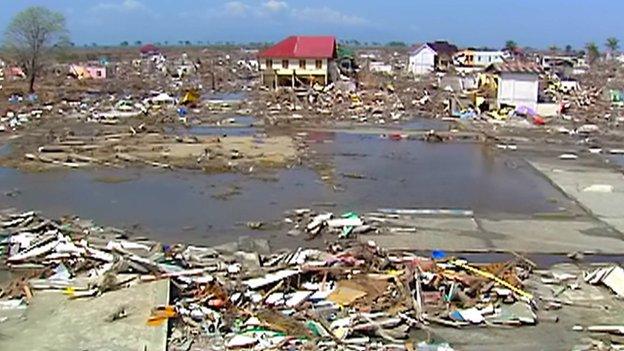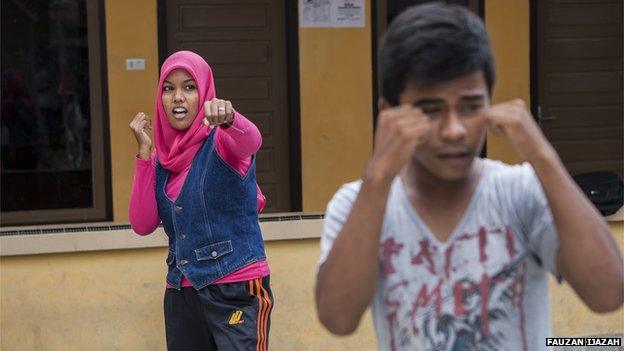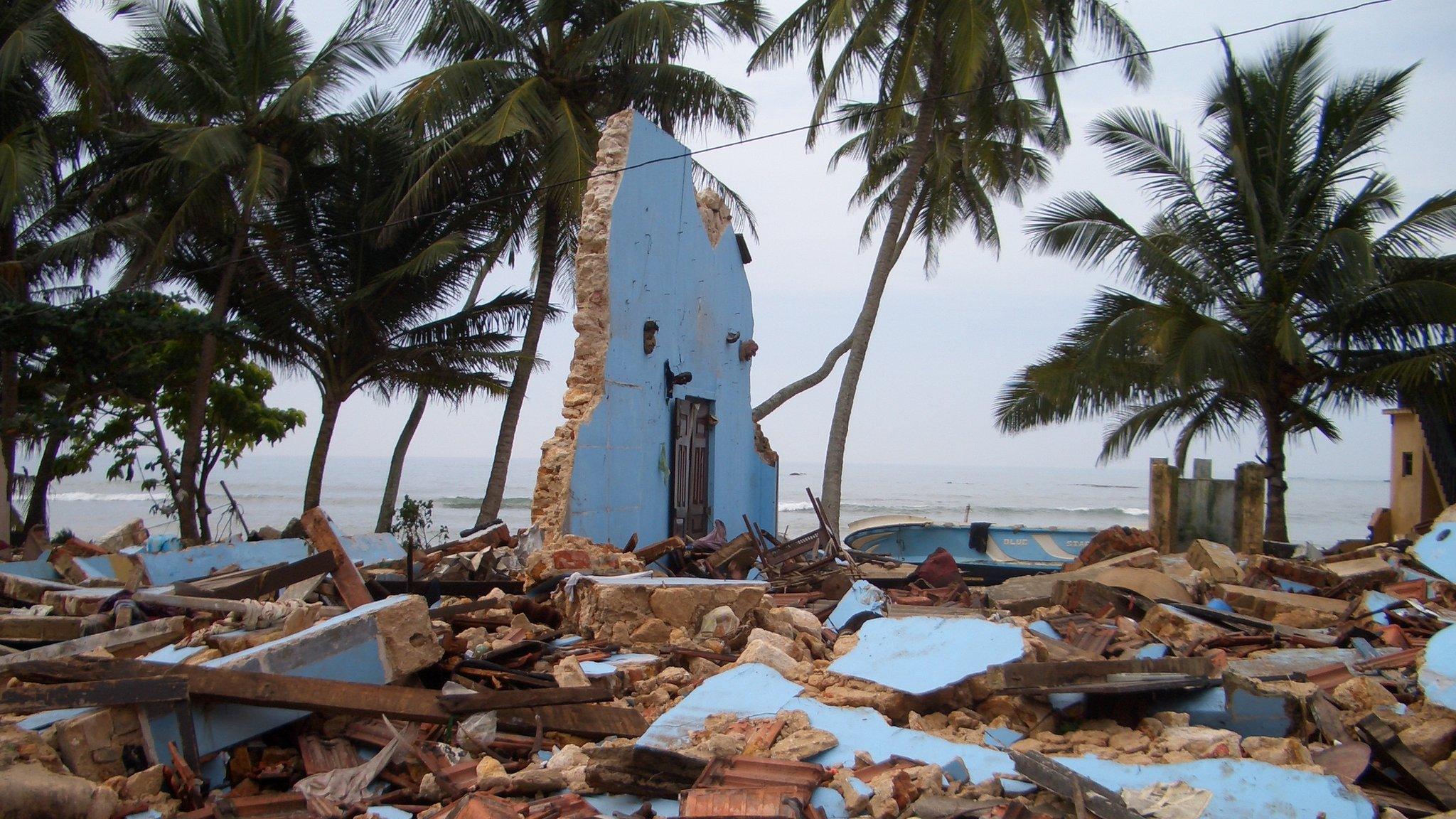Indian Ocean tsunami: Emotional reunion in Aceh 10 years on
- Published
Andrew Harding is reunited with a tsunami survivor in Banda Aceh 10 years on
It's hard to recognise Lhoknga at first.
The trees have grown back so enthusiastically that, from the road, the tiny village seems hidden behind a lush green curtain.
We stop the car on the outskirts, and I set off down a side road leading south toward the steep hills, looking out for a familiar face - and wondering how much it will have changed.
Ten years ago, I remember a very different scene.
In the days immediately after the tsunami - with everything flattened - you could see long distances in every direction from here - straight to the sea, perhaps two kilometres (1.4 miles) to the west and back towards the regional capital Banda Aceh.
And everywhere was mud, and debris, and misery. Emergency workers had just started trying to collect the dead, and hundreds of bodies lay in neat rows on the roadside.
Andrew Harding looks a the changes in Aceh 10 years on
Emotional reunion
It was in a makeshift camp for survivors in the grounds of a nearby mosque that I first met Mawardah Priyanka. She was 11 years old, exhausted, grimy and alone.

Lhoknga has been completely rebuilt with the help of international aid organisations
Her parents had both been killed when the wave - perhaps 35m-tall when it first hit the nearby coastal village of Lampuuk - reached their home.
It would be days before she discovered that her big sister, Mutiyah, 16, was still alive.
In the months that followed, I kept in contact with the sisters as they moved from the chaotic camp to their own tent, and eventually into a new brick and wood home built for them by the British charity Oxfam.
Mawardah went back to school. Mutiyah soon got married and moved away. Another, much older sister, Ita, came to share the house at Lhoknga.
And then, about eight years ago, I lost touch with them.
It's hard to get my bearings as I walk down what used to be a dirt track. Now it's a paved road, with a new bridge over a small stream.
On the right, I see a cluster of familiar buildings - concrete bases, with very simple wooden walls and tin roofs.
Someone shouts out that a foreigner is coming, and suddenly a tall, beaming figure is rushing out of the door.
It's happy, emotional - at times awkward - reunion for both of us. I'm immediately struck by how little Mawardah seems to have changed - height apart - and how much my return evidently means to her, and two days later, to her sister Mutiyah who travels in from the countryside.

In 2004, Banda Aceh was a wasteland...
And I feel a rush of guilt that I didn't do more to try to stay in touch after various local and foreign contacts - who'd acted as intermediaries in the early days - left the province.
"There is nobody to care about me - nobody loves me like my parents," says Mawardah tearfully, the following day.
The tsunami destroyed all trace of her parents - no photos of her mother or father remain, and Ita now is preoccupied with her young family, leaving Mawardah often alone with her chores, her wooden desk and a simple mattress on a concrete bedroom floor.
Empty houses
But it soon becomes clear that the disaster has shaped Mawardah's life in other, more positive ways too.
At the age of 21, she is a confident, intelligent and ambitious young woman.
She's won several educational scholarships from a local cement factory (now restored after the tsunami), and is studying English at a private college in Banda Aceh.
Over the next two days, as we talk in her small house, visit her school and lunch with her close circle of friends, I learn more about the trials and complexities of her life, and it strikes me that Marwadah's experiences reflect the broader circumstances of Aceh in the decade since the tsunami.
First there's the house - one of 140,000 built with the staggering $7bn (£4.5bn) in international aid given to Aceh.
Marwadah's was built quickly, and it shows. The roof leaks, its walls are flimsy, and I remember some unpleasant squabbles in the early years about which relatives would ultimately own it.
But the building has served its purpose, and the family readily admits it is better than the home they had before 2004.
Elsewhere, it's clear that a significant number of houses are now unoccupied - they were built in a flurry by a badly co-ordinated assortment of often competing aid agencies, flush with money and sometimes more anxious to spend it fast than to address the interests of local communities.
"I give the aid effort 65 (out of 100)," says Muslahuddin Daud, a World Bank official who himself nearly drowned in the tsunami.
"A lot of things are not perfect: $7bn - in many ways we could do better. A lot of houses are empty... redundant. We had more than 500 aid organisations and... a lot of overlapping.
Mr Daud said too much foreign money made people feel "entitled to get aid" and become lazy.
"Aceh has got stuck in terms of growth - the ability to manage the resources is not there," he said.
'Strong woman'
Then there's peace.
Before the tsunami, Aceh was wrestling with a violent separatist rebellion. Even as an 11-year-old, Mawardah remembers the impact it had on everyone's lives - the fear, the road blocks, and the clashes in the hills behind the village.

Mawardah (left) attends kickboxing lessons and dreams of becoming a reporter after studying in the US
But the disaster acted as an immediate catalyst for peace talks, and today the province continues to benefit from an autonomy deal that ended the conflict.
The new government has since introduced elements of Sharia - which many here, including Marwadah, publicly support.
But critics say public floggings and other punishments are an abuse of human rights, and that foreign investors are increasingly steering clear of a province that is now falling behind the rest of Indonesia in terms of economic growth and poverty reduction.
"We like Sharia. And I am a good Muslim," says Marwadah, but she believes the officials who police the new laws are often "hypocrites".
Late one afternoon, we stop at Marwadah's college in Banda Aceh where she's got a Thai kickboxing class with a group of other male and female students.
"She's a good student. She works hard, studies hard. As a girl, she has a spirit like a boy. She's strong. She doesn't give up easily," says her English teacher Maulizan Za.
He worries about inflation, but - like almost everyone else I ask here - believes that life is significantly better and safer than it was before the tsunami.
"My friends are my family now," says Mawardah, finishing the hour-long kickboxing class and getting ready to drive back home on her sister's motor scooter.
"I want to be a strong woman. After I graduate from this college I will next study in America, and get a job like a reporter. I feel my future will be bright," she concludes, then bursts into a confident, full-throated laugh.
- Published25 December 2014

- Published29 March 2011